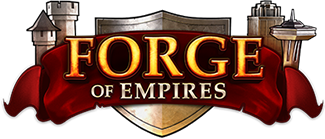Podstawy: Różnice pomiędzy wersjami
| Linia 16: | Linia 16: | ||
[[Epoki|Więcej informacji]] | [[Epoki|Więcej informacji]] | ||
== | ==Mapa kontynentu== | ||
[[File:Campaign_introduction.png|200px|right|link=]] | [[File:Campaign_introduction.png|200px|right|link=]] | ||
[[Campaign Map| | Projektowanie i zarządzanie miastem to nie wszystko. Na mapie kontynentu, możesz powiększyć swoje imperium o kolejne prowincje, zdobywając je jedna po drugiej. Zdobyte prowincje zapewniają niezwykle cenne nagrody, dlatego warto poświecić im nieco czasu. Mapa kontynentu jest podzielona na obszary, które z grubsza odpowiadają epokom w grze. Twój postęp na mapie powinien odpowiadać mniej więcej postępom w drzewku badań. Pamiętaj również, że poza mapą kampanii jest cały świat, z innymi mapami i jeszcze większą ilością przygód. | ||
[[Campaign Map|Czytaj więcej]] | |||
==The City== | ==The City== | ||
Wersja z 16:25, 18 wrz 2016
Welcome to Forge of Empires! Take charge of a mighty empire: Build your city, lead it successfully through the ages, research new technologies, conquer the world and triumph over your opponents.
Cel Gry
Droga do sukcesu leży w mądrym wykorzystaniu zasobów - tylko jeśli znajdziesz odpowiedni balans między dochodami a wydatkami możesz odblokować nowe technologie, rozwijać swoje miasto i podążać ścieżką do sławy i chwały.
Epoki
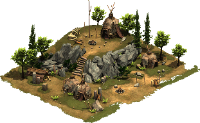
Rozpoczynasz jako wódz małego plemenia. Z czasem rozwiniesz się - odkryjesz nowe technologie, podbijesz nowe tereny i przemienisz niewielką osadę w kwitnącą metropolię.
Gra jest z grubsza podzielona na epoki. Rozpoczynasz swoją przygodę w Epoce Kamienia, i podróżujesz przez Epokę Brązu, Żelaza, różne etapy Średniowiecza, Epokę Kolonialną i Epokę Przemysłową. Następnie wkraczasz w nieco bardziej współczesne czasy epoki Postępowej, Modernizmu, Postmodernizmu i Współczesności. W kolejnym kroku nieco zaryzykujemy prognozując Przyszłość i znacznie ochłodzimy się w Arktycznej Przyszłości.
Nowe Epoki można osiągnąć przez odblokowanie technologii właściwych dla danego okresu w drzewku rozwoju. Po wejściu do nowej epoki, otrzymasz nowy ratusz, który automatycznie zastąpi starszą jego wersję. W większości wypadków, po wejściu do danej epoki, możesz od razu zbudować kilka budynków do niej przypisanych.
Mapa kontynentu
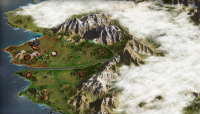
Projektowanie i zarządzanie miastem to nie wszystko. Na mapie kontynentu, możesz powiększyć swoje imperium o kolejne prowincje, zdobywając je jedna po drugiej. Zdobyte prowincje zapewniają niezwykle cenne nagrody, dlatego warto poświecić im nieco czasu. Mapa kontynentu jest podzielona na obszary, które z grubsza odpowiadają epokom w grze. Twój postęp na mapie powinien odpowiadać mniej więcej postępom w drzewku badań. Pamiętaj również, że poza mapą kampanii jest cały świat, z innymi mapami i jeszcze większą ilością przygód.
The City
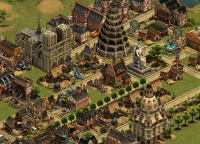
The nuts and bolts of a successful city is production. Only if you produce enough coins and supplies will you be able to get the newest buildings and military units. Be sure, though, to have as many residential buildings and production buildings as possible, since they give you your main income. Compare the buildings you are able to build carefully – there is always a building that is best suited to your playing style. Almost as important is the happiness level of your people, because if your citizens are happy, their production is much more efficient. So build cultural buildings and decorations, and always try to keep your people inspired.
Research

At the top of your city view in the center, there is a display showing your Forge Points. Every hour you get one more, until you have reached your maximum. These points are the engine that drives forth your empire: You need them to trade, to level up Great Buildings and, more importantly, for research. You conduct research by investing into technologies in the research tree with your points. If you have come up with the required amount and (if necessary) the unlocking costs, the advantages of the new technology will be available to you and you can build something new in your city from your building menu.
Quests
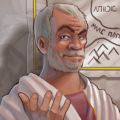
On the left of the screen you will see portraits of your advisors. If you click on one, you can do quests for them. Quests let you delve deeper into the game world, and they tell you the history of the world, its countries and rulers.
Fulfilling quests is worth it – because you get interesting rewards such as goods, coins, supplies, units that are not tied to slots in military buildings, and diamonds. There are basically two different types of quests. Your right hand man, Ragu Silvertongue, leads you through the main story. You cannot refuse his quests – you have to do them. At a later point in the game there will be a second questline with an additional storyline, quests which you can't abort either.
Your other advisors give you very different assignments: Your architect Fernikus will often ask you to construct buildings, and your scientist Mandrubar will push for research. You can reject or discard those quests of your other advisors. There is no shame in doing so, and if you doubt a quest fits into your strategy, you can reject or discard it. This may even occasionally be necessary, because unlike the quests of Ragu Silvertongue, it might happen that your advisors gives you an unattainable quest. Most of the quests that you reject are, then, however, irrevocably gone, and you will get no chance to do them later. But this is no big deal – it's impossible to see all the quests in the game, and you will receive only tasks that are adequate for your current situation in the game – and often a variety of possible situations are included. Therefore, if you reject a specific quest, you will get another to replace it.
Map and Battles
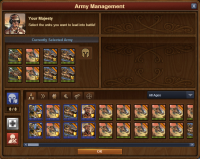
You should never lose sight of the continent map. Acquire provinces, because only then will you get more expansions you can place in your city and can utilize essential good deposits. Whether you trade for your sectors or conquer them is your decision. At first, it is easy to defeat the armies of your enemy with military units, but soon the battles become more challenging.
Prepare yourself well for this: pay close attention to what units your opponent has, and bring units on to the field which are a good match for them. In general terms, fast units are good at fighting against ranged units, and melee units are good against fast units. Ranged fighters in turn have an advantage against melee units. You can do more to increase your chances in battle: If you infiltrate a sector, the enemy units are already damaged at the beginning of the battle, which can provide a distinct advantage. Furthermore, if you are utilizing the terrain on the battlemap wisely, and always try to gang up on an enemy unit with several units of your own, you should prevail in battle and crush resistance. Read More
Players
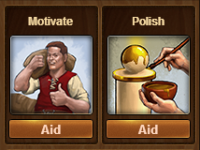
You are not alone in the world: In your neighborhood you can find other players with whom you can trade. If you deal well with others, they might visit your town and support you. Of course you can also visit cities and polish or motivate the buildings of your fellow players.
This gives you a few extra coins that can be of good use early in the game, as well as a small chance to find a valuable blueprint-piece for a Great Building. Great Buildings will provide great advantages to any player that manages to build one. In addition to peaceful coexistence, you also have the opportunity to fight against your neighbors. If you and your attacking army defeat the defenders of the enemy, you can plunder a building – this can generate additional income, but you should realize that such behavior does not win you friends. However, if you participate in tournaments, you can get coveted medals, but there will be almost no way around having to fight a lot.
Goods
After some time you will need goods. Always keep in mind and plan ahead as to ensure you never get to a point where you are stuck because you lack the necessary goods. You do not have to produce all the goods yourself – concentrate on those which you found good deposits for on the continent map. Team up with other players and trade these goods with them to get ones you don't have. You can also exchange goods with non-player dealers; but their exchange rate is so bad that you should do it only if you really have no other choice. There is also another way to get goods: If you employ your army, with skill and good timing, you can rob your neighbor of goods productions.
Tips
- Always plan ahead
- Remember to use your Forge Points before your Forge Point bar is full
- Make sure to start producing boosted goods as early as you can
- Use your boosted goods to trade on the market for goods you don't produce
- Use the space in your city as efficiently as you can
- Get all the expansions you can – they never expire and are essential for development
- Do not forget the daily bonus from your town hall
- Always pay attention to the level of happiness
- Visit the cities of other players and motivate or polish their buildings if you need to get coins fast
- In battle: infiltrate! Look at the enemy's set up and employ counter units, use terrain advantages and attack a unit with several units!
